NCERT Guides.Com
Free NCERT Solutions
- English Grammar Worksheets

Direct And Indirect Speech Worksheet for Class 6
by Manjusha · June 6, 2023
Change the following sentences into indirect speech.
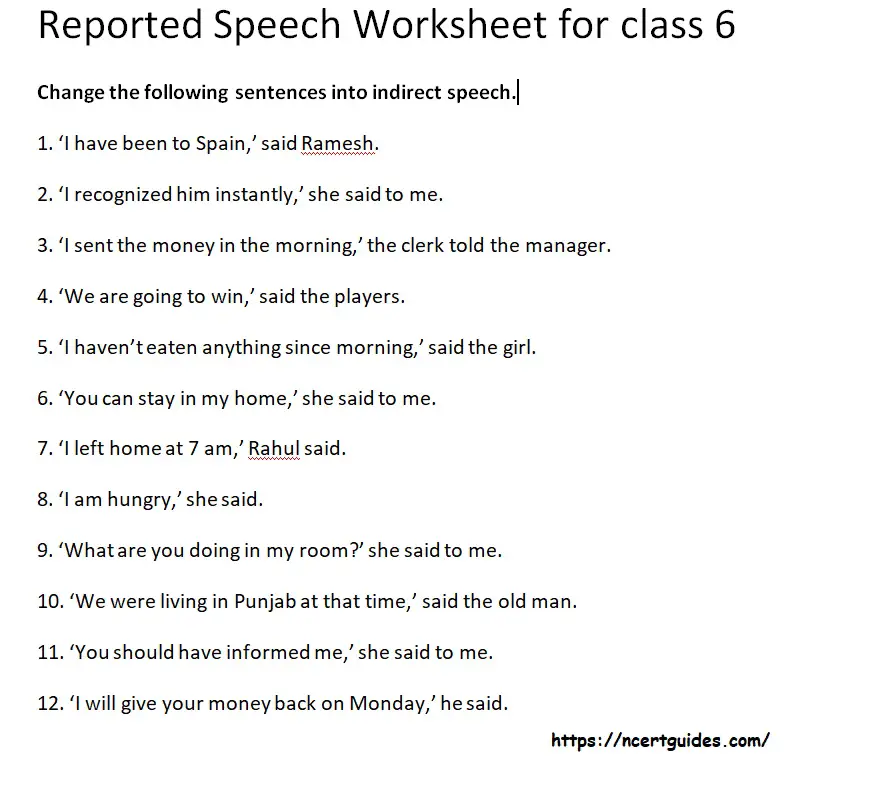
1. ‘I have been to Spain,’ said Ramesh.
2. ‘I recognized him instantly,’ she said to me.
3. ‘I sent the money in the morning,’ the clerk told the manager.
4. ‘We are going to win,’ said the players.
5. ‘I haven’t eaten anything since morning,’ said the girl.
6. ‘You can stay in my home,’ she said to me.
7. ‘I left home at 7 am,’ Rahul said.
8. ‘I am hungry,’ she said.
9. ‘What are you doing in my room?’ she said to me.
10. ‘We were living in Punjab at that time,’ said the old man.
11. ‘You should have informed me,’ she said to me.
12. ‘I will give your money back on Monday,’ he said.
1. Ramesh said that he had been to Spain.
2. She told me that she had recognized him instantly.
3. The clerk told the manager that he/she had sent the money in the morning.
4. The players said that they were going to win.
5. The girl said / complained that she hadn’t eaten anything since morning.
6. She told me that I could stay in her home.
7. Rahul said that he had left home at 7.
8. She said that she was hungry.
9. She asked me what I was doing in her room.
10. The old man said that they had been living in Punjab at that time.
11. She told me that I should have informed her.
12. He said that he would give my money back on Monday.
Tags: direct and indirect speech worksheet for class 6 reported speech worksheet for class 6
- Next story Present Continuous Tense Worksheet for Class 5
- Previous story Modal Auxiliary Verbs Worksheet for Class 6
You may also like...
Prepositions worksheet for classes 9 and 10.
November 22, 2021
by Manjusha · Published November 22, 2021 · Last modified April 30, 2023
Adverb Clauses Worksheet For Class 8
December 15, 2021
by Manjusha · Published December 15, 2021 · Last modified November 24, 2023
Subject Verb Agreement Exercise for Class 5
January 16, 2024
by Manjusha · Published January 16, 2024 · Last modified March 25, 2024
Leave a Reply Cancel reply
Your email address will not be published. Required fields are marked *
Save my name, email, and website in this browser for the next time I comment.
- Biographies
- Career Guidance
- Class 10 NCERT Solutions
- Class 2 Solutions
- Class 3 Solutions
- Class 4 Solutions
- Class 5 Solutions
- Class 6 NCERT Solutions
- Class 7 Solutions
- Class 8 NCERT Solutions
- Class 9 NCERT Solutions
- English Grammar
- English Vocabulary Exercises
- General Knowledge
- Inspirational Stories
- Kerala Syllabus English
- KSEEB Solutions
- Personality Development
- Political Science
- Sample Question Papers
- Social Science
- Social science
- State Boards
- Tamil Nadu Board
- Uncategorized
- West Bengal Board
- Writing Skills
- Underline the Proper Nouns Worksheet for Class 2
- Reported Speech Exercise for Class 10 TN Board
- List of Plural Nouns for Class 10
- Suffixes Worksheet for Class 10
- Synonyms Worksheet for Class 10 TN Board
Direct and Indirect Speech Exercises for Class 6 with Answers CBSE
Direct and indirect speech exercises for class 6 with answers cbse pdf.
Rules For Changing Direct Speech To Reported Speech
1. Changes in reporting verb
- Affirmative sentences: said, told (object), asserted, replied, assured, informed, responded, whispered, alleged, believed, assumed, thought
- Interrogative sentences: asked, inquired, wanted to know, enquired
- Imperative sentences: ordered, begged, pleaded, implored, advised, demanded
2. Change of pronouns
- The conjunction that is used to connect the reporting verb with what is said.
- A first-person and second-person generally change to third person (depending upon object to reporting verb)
- In case the reporting verb is in present, the tense of verb in reported speech continues to remain in the present tense.
3. Change of tenses When we report something after a certain period of time, and what we are talking about has already happened, we change the tense of the sentence being reported into a corresponding past tense. Read the following table carefully.
In general, present tense becomes past tense:
- Past tense becomes past perfect tense.
- Past continuous becomes past perfect continuous tense.
- Past perfect and past perfect continuous remain unchanged.
4. Change of situations When we report sentences in indirect speech, the words denoting places or time are changed.
5. Universal truths When universal truths are being reported we may choose either to retain the original tense of the sentence or to change it.
6. Questions and answers
7. Commands, orders and requests
8. Modals verbs
Changes in modals
- can – could
- will – would
- shall – should
- may – might
Would, should, could, might, ought to and must are unchanged.
1. What does Ditya want to buy and why? 2. Why Ditya’s clothes are not suitable for the occasion? 3. What does father reply in the end of the story above?
B. Change the following sentences into indirect speech from the story above.
1. Ditya says to her father, “I want to buy new clothes for my graduation ceremony.” ___________________________________________________ 2. “These dresses are not suitable for the occasion,” says Ditya. ___________________________________________________ 3. “You have just borrowed three dresses a few days ago,” replies father. ___________________________________________________
Direct And Indirect Speech Practice Exercises for Class 6 CBSE
A. Complete the sentences into indirect speech.
1. Mohan (to Seema): I like your hairstyle. Mohan tells Seema : ____________
2. Parrot: I can speak English. The parrot says ____________
3. The fairy (to boy): I will grant you a wish if you won’t tell a lie. The fairy tells the boy ____________
4. The doctor (to a patient): I prescribed you a medicine but I did not charge you for it. The doctor tells ____________
5. The guide (to tourists): We are going to visit the Mahendra caves and there we will get to see bats. The guide says ____________
B. Change the following Direct speech into Indirect.
1. She says, “I will do this work.” ___________________________________
2. Sunita says, “He can come and stay in my flat.” ___________________________________
3. Amrita says to Hari, “I am taking my lunch now.” ___________________________________
4. Nancy says, “I am going to Paris next month.” ___________________________________
5. Vikas says, “I work hard on this project.” ___________________________________
6. She says, “This book is mine.” ___________________________________
7. Aunt Kajol says to me, “You will send these books to my place the day after tomorrow.” ___________________________________
8. Chetan says to mother, “I will tell you the truth.” ___________________________________
9. I have told him, “My father is a doctor.” ___________________________________
10. Meeta says, “I am sure everything will be alright after the operation.” ___________________________________
C. Write the correct pronouns in the following sentences in Reported speech.
1. Ankit: “I work in an office.” Ankit told me (that) ____________ worked in an office.
2. La lit and Puneet: “We play football.” Lalit and Puneet told me (that) ____________ played football.
3. Anjali: “I like my cat.” Anjali told me (that) ____________ liked ____________ cat.
4. Sanju: “Can you see me?” Sanju asked me ¡f ____________ could see ____________.
5. Kanika : “I will have to borrow your pencil.” Kanika told me (that) ____________ would have to borrow ____________ pencil.
6. Meera: “My father is American.” Meera told me (that) ____________ father is American.
7. Pooja and Rajni: “Can we use your camera?” Pooja and Rajni asked me if could use ____________ camera.
8. Raja: “How is your journey?” Raja asked me how ____________ journey was.
9. Priya and Ritu: “We love our pets.” Priya and Ritu told me (that) ____________ loved ____________ Pets.
10. Grandmother: “Piease bring me a cup of my tea.” Grandmother told me to bring ____________ a cup of tea.
Direct And Indirect Speech Exercises for Class 6 – Part II
Fundamentals: If the Reported Verb is in Past tense (Said, told instead of say, tell) then the tense in the reporting speech changes accordingly.
1. Why does Rita argue with her mother? 2. Why does Rita’s mother never give her a pizza or a burger to eat? Give two reasons. 3. What does Rita’s mother advice her in the end of the story?
B. Read the conversation between mother and daughter in the story above and complete the paragraph that follows.
Mother told Rita 1. ____________. Rita replied that 2. ____________ and told her mother that she never gave her a pizza or burger. Mother said that they are not good for her health and reminded her 3. ____________. Rita then asked her mother to give her french fries and a shake. Mother warned her that if she lived on junk food, she would spoil her health.
Direct And Indirect Speech Worksheets With Answers Pdf
A. Change the following into reported speech.
1. Nikhil said, “I will come tomorrow.” ____________________________________
2. Paras said, “I have passed the examination.” ____________________________________
3. He said, “We are going for a picnic today.” ____________________________________
4. She said, “Aayush is working hard.” ____________________________________
5. She said, “I have been writing for an hour.” ____________________________________
6. Rita said, “The girls were singing in the music period.” ____________________________________
7. The teacher says, “Sehaj does not work hard.” ____________________________________
8. I said to her, “I can solve the sum.” ____________________________________
9. Aman said, “Vinay may not come to school today.” ____________________________________
10. The teacher said, “The earth is round.” ____________________________________
11. He said to his friend, “My sister has written a letter.” ____________________________________
12. The priest said, “God is great.” ____________________________________
13. Arjun said, “I can play sitar.” ____________________________________
14. Mohan said, “My sister has been studying since morning.” ____________________________________
16. They said to me, “We cannot help you now.” ____________________________________
17. Sambhav said, “My father is writing a letter.” ____________________________________
18. She said to me, “I will go to the library tomorrow.” ____________________________________
B. Finish the sentences using Reported speech.
Question 1. Niru: Will you please give me your notebook? Indu: Yes. Which one do you need? Niru asked Indu if ……………………………….. Indu said, ……………………………….. She asked ……………………………….. Answer: Niru asked Indu if she would give Niru her notebook . Indu said yes . She asked Niru which one she needed .
Question 2. Mohini said, “Where can I find the post office?” The policeman said, “It is on the road behind the clock tower.” Mohini said, “Thank you. I have been looking for it for a while.” Mohini asked the policeman ………………………………. . The policeman said ………………………………. . Mohini ……………………………….. him and added that she had ……………………………….. Answer: Mohini asked the policeman where he could find the post office . The policeman said that it was on the road behind the clock tower . Mohini thanked him and added that she had been looking for it for w while .
Question 3. Teacher: Rohan, what are you thinking? Hurry up and finish your work. Rohan: Ma’am, I have almost finished. I was trying to recall my last week’s lessons.
The teacher ……………………………….. Rohan ……………………………….. She told him to ……………………………….. Rohan replied ……………………………….. He said that he ……………………………….. Answer: The teacher asked Rohan what he was thinking . She told him to hurry up and finish his work . Rohan replied that he had almost finished . He said that he was trying to recall his previous week lessons .
Question 4. Father: You look worried. What’s the matter? Son: It’s about my admission to an engineering college. Father: When are your results expected? Son: Within a week, Father.
The father noticed that his son ……………………………….. He asked him ………………………………. . The son replied ………………………………. . The father asked ………………………………. . The son replied ……………………………….. Answer: The father noticed that his son looked worried . He asked him what the matter was . The son replied that it was about his admission to an engineering college . The father asked his son when were his reults expected . The son replied that they were expected within a week .
Question 5. Jenny: Let’s go for a walk. Susan: Yes. Give me ten minutes. Jenny: Let’s go now. Susan: I will just take a few more minutes. Jenny: Why must you delay? Susan: What makes you so impatient?
Jenny asked Susan ……………………………….. Susan replied politely ……………………………….. Jenny was, however, impatient and said ……………………………….. Susan ……………………………….. Answer: Jenny asked Susan to go for a walk . Susan replied politely in the affirmative and asked to be given ten minutes . Jenny was, however, impatient and said that she wanted to go then . Susan said that she would take a few more minutes. Jenny asked her why she must delay. To this, Susan asked Jenny what made her so impatient .
- Grade Levels
- Search Site
- Grade 6 >>
Direct and Indirect Speech Worksheets
Related ela standard: l.6-7.1.
Direct speech is basically a quote or the literal words that were spoken by a subject. When you use this in your writing it must be surrounded by quotation marks (" "). Using direct quotes helps your audience understand the frame of mind of the subject. Indirect speech is reporting what was said by a subject. Since all indirect speech has already happened it is reported in the past tense. To display indirect speech we surround it with inverted commas (' '). These worksheets will have students using this technique in the own writing and help them with syntax and mechanics of their work.
Direct and Indirect Speech Worksheets To Print:
What's Your Approach - Determine whether each sentence below contains this form of expression. Write direct or indirect on the line.
Sentence Smasher - Rewrite each sentence using indirect speech.
Peter and Dan - Read the passage. Underline the speaker's words. Then, rewrite the passage, incorporating this in there.
Too Much? - If the sentence is uses the direct form, write a D on the line. If it uses the indirect form, write an I on the line.
Be The Director - The comic strip below uses speech bubbles to show the direct form. Rewrite the comic strip on the lines below, using the indirect form.
Revising the Direct Form - Read the script. On the lines, rewrite the script as a paragraph, using indirect speech.
Speaker's Words - Indirect speech is when a speaker's words are reported by someone else, and the words are not quoted.
A Walk in the Park - Read the script. Rewrite it in paragraph form using both formats. Follow the directions in parentheses.
Play Re-writes - John said his train would arrive at noon and maybe it did.
Using Roundabouts - Read the cartoon. Then describe what is happening. Use the indirect technique in your paragraph to tell the reader what Abe and Lauren say.
Who Said That? - Underline what the speaker says in each sentence. Then rewrite each sentence using the proper form.
About the Car... - You want to know if Dad will let you take the car.
What Did They Say? - Rewrite the sentences using all the techniques that you have learned so far. Make sure the syntax is spot on.
Tell Me About the Party - Will told us all about the party. He said there were about ten people there. I asked him about Robert, and confirmed that Robert was in attendance.
Writing The Other Way - Most students find this harder to do then its counterpart.
What Is the Difference Between Direct and Indirect Speech
Here are the basic differences between direct and indirect speech.
Difference In Meaning
There are two ways to describe the speech. These two ways are known as indirectly and directly. These two methods are widely used in the English language to imply what others have said. Both have different rules when writing.
The direct form occurs when the exact same words of the speech are repeated without any interruptions or additions. Direct speech implies exactly what has been said in the same tone. The actual words that were used by the speaker are written in indirect speech. Nothing new is added. Expressions are also mentioned in the exact same way by maintaining the tone of the actual speaker. The direct form is used when you do want to keep things simple and accurate.
The indirect form occurs when the actual words of the speaker are not quoted. Indirect speech changes certain elements from the actual words. It occurs when someone else tries to speak the original words.
Difference In Alternative Name
Both direct and indirect speech have their own alternative names. Direct format is commonly known as quoted speech. Whereas, indirect form is commonly known as reported speech.
Difference In Point Of View
The indirect and direct speech also differ in point of views. The point of view of the direct speech is that of the speaker. Whereas, the point of view of indirect form is that of the listener.
Difference In Usage
The use of this technique in written has a difference in purpose and usage as well. The direct form is used when we want the reader to know what exactly was said by the speaker. No change in the message really ever occurs. Whereas, the indirect technique is used when we use our own words to report the words of someone else.
Difference In Quotation Marks
Direct technique uses quotation marks whereas, the indirect form does not use quotation marks.
Direct: She said, "I am going to the market". Indirect: She said that she was going to the market.
Teachers: Upgrade Now
- Print all 25,000+ worksheets
- All grade levels and topics
- Save endless hours of your time...
- Answers to everything too!
Get FREE English Worksheets In Your Email
- How We Are Aligned To The Common Core
- Educator Resources
- Privacy Policy
- Newsletters
© English Worksheets Land . All rights reserved.
Direct and Indirect Speech for Class 6
Jump ahead to:
Hello kids, We are going to learn Direct and Indirect Speech for class 6. What about its Definition , Examples , and Exercise For for class 6? Here we have given CBSE English Grammar Direct and Indirect Speech for class 6 . Let us start with Direct speech and understand both types of speech separately.
What is Direct Speech?
Definition: In this form of speech , the sentences are framed by the words that are spoken by the speaker, there is no change in the words exactly the same words are being reported in the sentence. The words spoken by the speaker are put into quotation marks or in double inverted commas (” “). In other words, when we repeat the words of the speaker it is said to be direct speech .
Examples of Direct Speech For Class 6
- He said, “I will go to Mumbai tomorrow”.
- Satyam said, “I will be there at 2 pm”.
- Sheelu conveyed, “I am going out today” .
- “I had a pain in my stomach yesterday”.
- “Where do you stay”?
From the above examples, it can be figured out that the words are exactly reported by another person hence they are said to be direct speech.
What is Indirect Speech?
Definition: In Indirect narration , the sentences are designed in such a type, the words that are used by the person are not exactly the same as the speaker said or conveyed. Indirect speech is also known as reported speech . It generally talks about the past.
Examples of Indirect speech For Class 6
- Ram said that he had bought a new car.
- She said that she will not come to the party.
- He said that he is living in France.
- Gargi said that she need help with her homework.
- She said that she had been waiting for Ram for an hour.
In the above examples, it can be noticed that the words are not exactly the same as the speaker said, hence they fall in the category of indirect speech.
Rules For Changing Direct Speech into Indirect Speech
Let us learn some of the rules for changing direct speech into indirect speech for different tenses.
1. No changes in the tense are made if:
- Reporting verb is in the present tense .
- If the reported words are true at the time of reporting.
- If reported speech reports universal truth .
Some of the examples satisfying the above conditions:
- Ram says, “I have just arrived”. (Direct Speech) Ram says that he has just arrived. (Indirect Speech)
- Radha said, “I am going tomorrow”. (Direct Speech) Radha said that she is going tomorrow. (Indirect Speech)
- The sunsets in the west. (Direct Speech) The sunsets in the west. (Indirect Speech)
2. Changes in tenses
When the reporting is in the past tense, the tense in the indirect speech changes as follows:
i. Simple present changes into simple past .
ii. Present continuous changes to past continuous .
iii. Present perfect changes to past perfect .
iv. Present perfect continuous changes to past perfect continuous .
v. Simple past changes to past perfect .
vi. Past continuous to Past perfect continuous .
vii. In Future tense will changes to would .
- Ritu said, “I drink hot tea”. (Direct Speech) Ritu said that she drank hot tea. (Indirect Speech)
- Shyam said, “I am reading a novel. (Direct Speech) Shyam told me that he was reading a novel. (Indirect Speech)
- Radha said to me, “I have spent my holidays in Paris. (Direct Speech) Radha said that she had spent her holidays in Paris. (Indirect Speech)
- Rachna said, “I have been waiting for him for two hours. (Direct Speech) Rachna complained that she had been waiting for him for two hours. (Indirect Speech)
- He said, “My mother arrived on Saturday”. (Direct Speech) He said that his mother had arrived on Saturday. (Indirect Speech)
- They said to me, “We were living in America”. (Direct Speech) They said that they had been living in America. (Indirect Speech)
- Richa said, “I will be in the mall”. (Direct Speech) Richa said that she would be in the mall. (Indirect Speech)
3. Changes in Modals
Some of the modals change not all modal verbs change. The modals that changes are as follows:
i.) Will changes to would
- Rachel said, “We will be there”. (Direct Speech) Rachel said that they would be there. (Indirect Speech)
- Priya said to me, “I will go shopping”. (Direct Speech) Priya said that she would go shopping. (Indirect Speech)
ii.) Shall change to would ( in questions shall change to should )
- She said, “I shall need more money for shopping. (Direct Speech) She said that she would need more money for shopping. (Indirect Speech)
iii.) can change to could
- He said, “I can run 2 km”. (Direct Speech) He said that he could run 2 km. (Indirect Speech)
- Vivek said, “I can swim fast”. (Direct Speech) Vivek said that he could swim fast. (Indirect Speech)
iv.) may changes to might (if there is a possibility) otherwise may change to could (if it shows permission)
- Vishal said, “I may come to play “. (Direct Speech) Vishal said that he might come to play. (Indirect Speech)
- He said, “You may wait in the guest room”. (Direct Speech) He said that we could wait in the guest room. (Indirect Speech)
4. Changes in time expressions and Adverbs
Some of the common words that change while converting direct speech into indirect speech.
- Today changes to that day/the same day .
- Tomorrow changes to the next day/ the following day .
- Yesterday changes to the day before/ the previous day .
- Now changes to then.
- Ago changes to before .
- Here changes to there .
- This changes to that .
- He said, “I will be going to Paris tomorrow”. (Direct Speech) He said that he would be going to Paris the next day/the following day. (Indirect Speech)
- Raju said, “We were planning to go Shimla today”. (Direct Speech) Raju said that they had been planning to go to Shimla that day/the same day. (Indirect Speech)

Miscellaneous Exercise on Direct & Indirect Speech for class 6
Convert the sentences from direct speech to indirect speech given below.
- The teacher said, “Nobody can answer the questions”.
- The traffic police asked the man, “Do not park your vehicle here”.
- The guide said, “You shall go to see the fort”.
- The Judge said, “Call the victim in the court”.
- The Principal said, “All the boys are playing in the garden.
- Ram said, “I like this song”.
- She said, “I don’t speak Marathi”.
- Raman said, “I never make mistakes”.
- He said. “the film has begun at 6 pm”.
- Chetan said, “I like the book”.
- The teacher said that nobody could answer the questions.
- The traffic police asked the man that not to park his vehicle there.
- The guide suggested that we should go to see the fort.
- The Judge commanded that call the victim in the court.
- The Principal said that all the boys were playing in the garden.
- Ram said that he liked that song.
- She said that she didn’t speak Marathi.
- Raman said that he never made mistakes.
- He said that the film had begun at 6 pm.
- Chetan said that he liked the book.
Quiz: Direct and Indirect Speech for Class 6
Hi if you want to download the pdf of direct and indirect speech for class 6 click on the link given below. Download pdf (4615 downloads )

1 thought on “Direct and Indirect Speech, Class 6 | Exercise, Examples, Worksheet, PDF”
Thanks for visit our site, If you want to know more about Direct and Indirect Speech for Class 6. For any query comment below.
Leave a Comment Cancel Reply
Your email address will not be published. Required fields are marked *
Save my name, email, and website in this browser for the next time I comment.
Notify me of follow-up comments by email.
Notify me of new posts by email.
- Child Login
- Number Sense
- Measurement
- Pre Algebra
- Figurative Language
- Reading Comprehension
- Reading and Writing
- Science Worksheets
- Social Studies Worksheets
- Math Worksheets
- ELA Worksheets
- Online Worksheets
Browse By Grade
- Become a Member

- Kindergarten

- Active and Passive Voice
- Capitalization
- Comparative and Superlative Adjectives
- Conditionals
- Conjunctions
- Contractions
- Determiners and Quantifiers
- Diagramming Sentences
- Direct and Indirect Objects
- Direct and Indirect Speech
- Double Negatives
- Interjections
- Parts of Speech
- Phrasal Verbs
- Prepositions
- Punctuation
- Question Words
- Sentences for Beginners
- Shift in Verb Tenses
- Simple, Compound, and Complex Sentences
- Subject and Object Complements
- Subject and Predicate
- Subject-Verb Agreement
- Tag Questions
- Transition Words
- Types of Sentences

- Abbreviation
- Alphabetical Order
- Collocations
- Commonly Confused Words
- Compound Words
- Connotations and Denotations
- Crossword Puzzles
- Positive and Negative Connotations
- Shades of Meaning
- Sorting and Categorizing
- Word Search

- Alliteration
- Onomatopoeia
- Personification
- Proverbs and Adages
- Rhyming Words

- Beginning Sounds
- Consonant Blends
- Consonant Digraphs
- Ending Sounds
- Long and Short Vowels
- Middle Sounds
- R-Controlled Vowels
- Silent Letters
- Vowel Digraphs

- Kindergarten Reading Comprehension
- Grade 1 Reading Comprehension
- Grade 2 Reading Comprehension
- Grade 3 Reading Comprehension
- Grade 4 Reading Comprehension
- Grade 5 Reading Comprehension
- Grade 6 Reading Comprehension
- Grade 7 Reading Comprehension
- Grade 8 Reading Comprehension

- Alphabet and Letters
- Cause and Effect
- Dictionary Skills
- Editing and Proofreading
- Facts and Opinions
- Making Predictions
- Word Recognition
Direct and Indirect Speech Worksheets
- Language Arts >
- Grammar >
Fend off any errors that might creep into your speech with our free, printable direct and indirect speech worksheets! We use direct speech to quote the exact same words that someone utters. The indirect speech is used to report someone's speech, often with words slightly changed. Convert a range of sentences including the interrogative, imperative, and exclamatory sentences into reported speech. Make your grammar life richer and more fulfilling with this coveted collection of quoted and reported speech worksheets pdf!
Our direct and reported speech worksheet pdfs are most recommended for children in 4th grade through 8th grade.
Reported Speech with Time Expressions
Kids in 5th grade, 6th grade and 7th grade convert sentences into indirect speech, paying attention to how expressions of time change here. For example, write "that day" for "today" and "the next day" for "tomorrow".
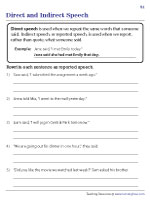
Writing Statements in Reported Speech
Both direct speech and indirect speech have their natural habitat, and children must use each where it belongs. In these direct and indirect speech worksheets pdf, grade 7 and grade 8 kids write each statement as reported speech.
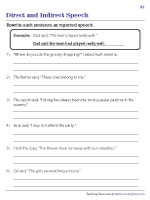
Changing Interrogative Sentences into Reported Speech
Don't write a question mark after "Sam asked me where I was going". This is a statement and not a question, although it contains the word "where". Let children write each interrogative sentence in reported speech here.
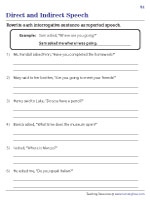
Converting Imperative Sentences into Reported Speech
Watch grade 6 kids rewrite sentences that denote a request, command, or advice in reported speech, using reporting verbs like "ordered", "instructed", and more in these printable direct and indirect speech worksheets!
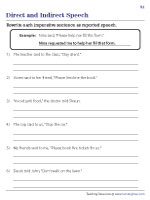
Rewriting Exclamatory Sentences Using Reported Speech
Thanks to scenarios that exclaim – sometimes with joy and other times with sorrow – these grade 8 worksheets are kinetic and ebullient. Upgrade your practice by converting exclamatory sentences into indirect speech.
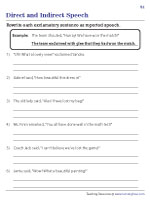
Changing Reported Speech into Direct Speech
In this section of our printable indirect and direct speech worksheets, there are sets of sentences in reported speech, and children are expected to write each sentence in the direct or quoted speech.
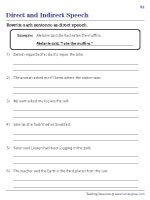
Punctuating Direct Speech
Instruct children in grade 4 and grade 5 to read the given sentences and insert commas and quotation marks wherever necessary to reflect direct speech.
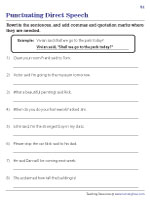
Related Printable Worksheets
▶ Active and Passive Voice
▶ Phrases
▶ Types of Sentences
Tutoringhour
What we offer, information.
- Membership Benefits
- How to Use Online Worksheets
- How to Use Printable Worksheets
- Printing Help
- Testimonial
- Privacy Policy
- Refund Policy
Copyright © 2024 - Tutoringhour
You must be a member to unlock this feature!
Sign up now for only $29.95/year — that's just 8 cents a day!
Printable Worksheets
- 20,000+ Worksheets Across All Subjects
- Access to Answer Key
- Add Worksheets to "My Collections"
- Create Custom Workbooks
Digitally Fillable Worksheets
- 1100+ Math and ELA Worksheets
- Preview and Assign Worksheets
- Create Groups and Add Children
- Track Progress
Class 6 English Grammar Chapter 24 Direct and Indirect Speech
Class 6 English Grammar Chapter 24 Direct and Indirect Speech. The word—speech—means whatever we speak or write. Speaking or writing the words of an another person can be done in two ways, 1. by repeating the words of the other person as they were, 2. by stating the meaning of the words of the other person in your own words. Suppose Aman speaks the words: “I am ill today.” Any person other than Aman can express his words in the following two ways: (a) Either he says: Aman said, “I am ill today.” (b) Or he can say: Aman said that he was ill that day.
- Class 6 English Grammar Direct and Indirect Speech
- Class 6 English Grammar Chapter 24 Revision Book
- Class 6 English Grammar Next Chapter
- Class 6 English Grammar Main Page
- Class 6 English NCERT Solutions
Direct Speech
Aman said, “I am ill today.” In this sentence, the very words of the speaker, i.e., “I am ill today” are quoted within inverted commas (” “). This is called the Direct Speech. The sentence within ” ” is called reported speech. The verb that introduces the reporting speech is called reporting verb.
INDIRECT SPEECH Aman said that he was ill that day. In the above sentence, we have reported what the speaker said, i.e. he was ill that day without quoting the exact words. This is called Indirect Speech. Carefully Read the following points: In Direct Speech: 1. The Reported Speech is put within Inverted Commas (” “). 2. The first word of the Reported Speech begins with a capital letter. In Indirect Speech: 1. Inverted commas are not used for the Reported Speech It is generally introduced by the conjunction that, if, etc. 2. The comma separating the Reporting Verb from the Reported Speech is removed. 3. The tense of the Reporting Verb is never changed.
RULES FOR THE CHANGE OF TENSES
Conversion of Assertive Sentences into Indirect Speech Rule: If the Reporting Verb is in the Present or Future Tense, the tense of the verb in the Reported Speech is not changed at all as,
CHANGE IN TENSES
Rule: If the Reporting Verb is in the Past Tense, the tense of the R.S. will change as under: Simple Present changes into Simple Past: Direct: He said, “Sandhya sings a nice song.” Indirect: He said that Sandhya sang a nice song. Present Continuous changes into Past Continuous: Direct: He said, “The girls are picking flowers.” Indirect: He said that the girls were picking flowers. Present Perfect changes into Past Perfect: Direct: Father said to me, “It has been raining since morning.” Indirect: Father told me that it had been raining since morning. Simple Past changes into Past Perfect: Direct: I said to him, “They enjoyed the magic show.” Indirect: I told him that they had enjoyed the magic show. Past Perfect and Past Perfect Continuous are not changed: Direct: She said, “He had not seen the Taj before.” Indirect: She said that he had not seen the Taj before. Shall and will of future tense become should/would: Direct: I said to her, “I shall help Sagun”. Indirect: I told her that I should/would help Sagun. All Present Tenses change into their corresponding Past forms: is, am become was can becomes could are becomes were may becomes might has, have become had was/were become had been The forms of could, should, would, might, had are not changed: Direct: I said to him, “I am a poor man.” Indirect: I told him that I was a poor man.
CHANGE OF PRONOUN
Pronouns of the first person change according to the person of the Subject of the Reporting Verb: Direct: I said, “I have done my duty.” Indirect: I said that I had done my duty. Rule: Pronouns of the third person remain unchanged. Direct: I said, “He has done his duty.” Indirect: I said that he had done his duty. CHANGE OF WORDS DENOTING TIME AND POSITION here becomes there this becomes that ago becomes before today becomes that day thus becomes so now becomes then CONVERSION OF QUESTIONS INTO INDIRECT SPEECH 1. The Reporting Verb is changed to asked, enquired, demanded etc. 2. Whether or if is used if the R.S. begins with a Helping Verb or a Modal Auxiliary like do, does, did, is, am, are and can, could, should, would etc. in place of comma and inverted commas. 3. All questions beginning with interrogative words like how, what etc. remain unchanged. 4. The Interrogative form is changed into assertive form. The Question Mark is dropped. 5. Tenses, Pronouns and Words denoting nearness are changed according to the rules already stated. Direct: 1. He said to me, “Do you take tea?” Indirect: He asked me if I took tea.
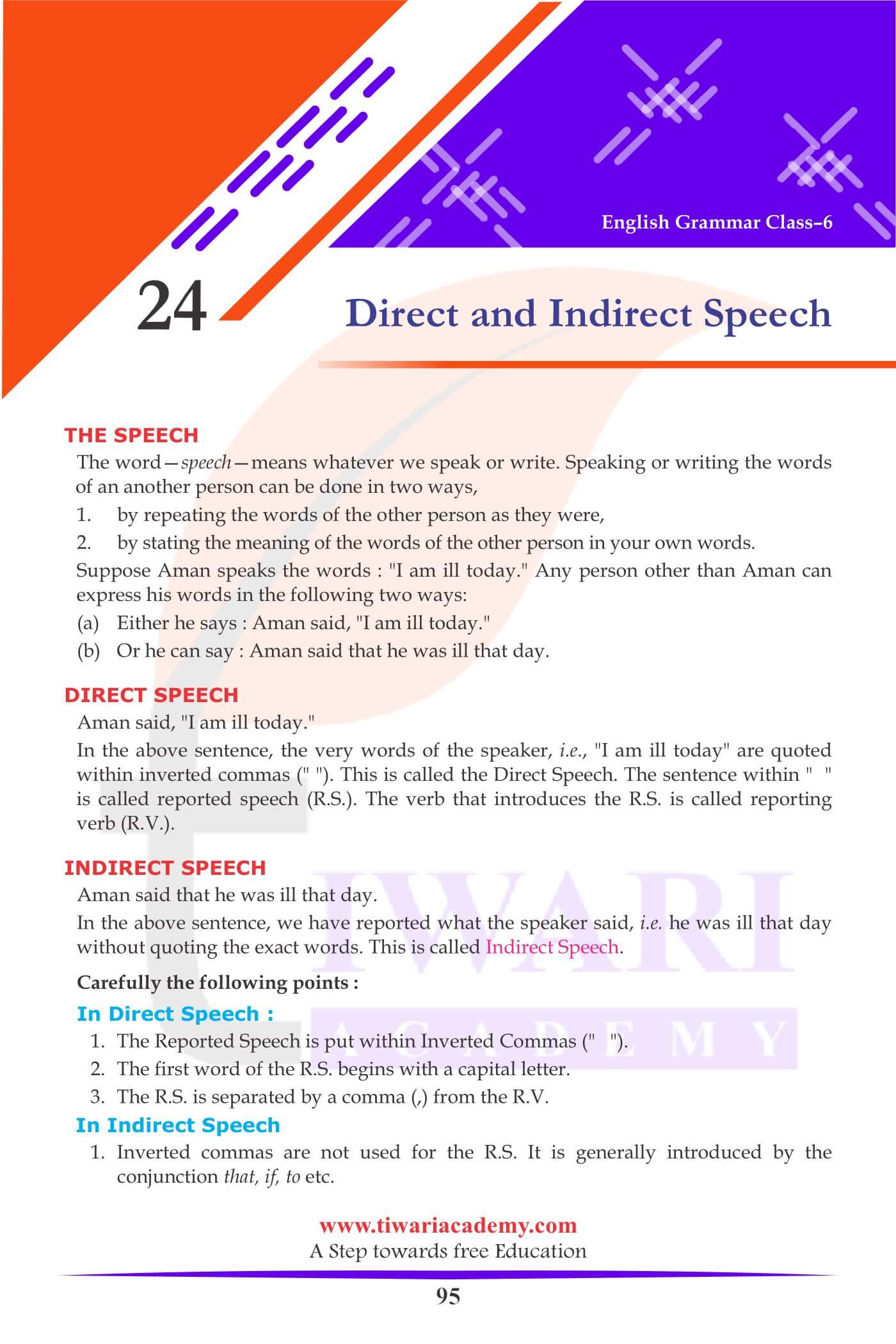
Copyright 2024 by Tiwari Academy | A step towards Free Education

You are using an outdated browser. Please upgrade your browser to improve your experience.

Direct Speech and Indirect Speech
Change the indirect speech into direct speech in this worksheet. 1. the movie was boring when changed becomes the speaker said that the movie was boring. schools and students globally prefer math and english worksheets from www.grade1to6.com, subscribe today for a complete learning resource pack.
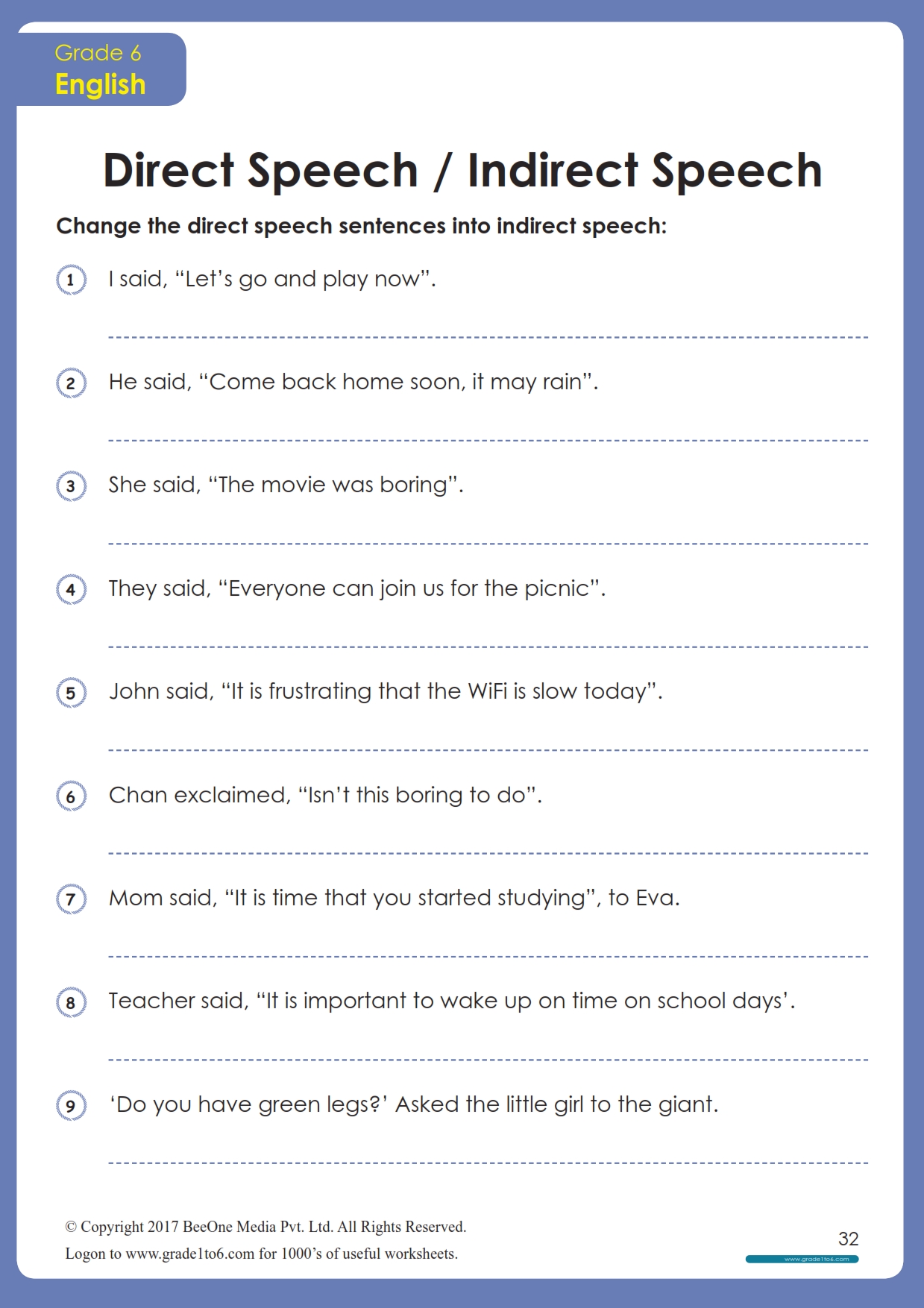
Help and Support
- Advertising & Marketing
- Terms and Conditions
BeeOne Media Private Limited Mayur Vihar, Phase - I Delhi - 110091 Email: [email protected] +91 99109 88727 (Phone and WhatsApp)
For any IPR(including Copyright) Licensing or other Contractual & Legal issues please contact our Attorneys:
Email: [email protected] / [email protected] Web: www.lexport.in
COPYRIGHT © GRADE1TO6.COM (A UNIT OF BEEONE MEDIA PVT. LTD.) New Delhi, 2016. All Rights Reserved.
- English Grammar
- Grammar Exercises
- Direct And Indirect Speech Exercises
Direct and Indirect Speech Exercises
Direct and indirect speech is one topic in English grammar that confuses most language learners. It need not necessarily be so; if you understand how it works, you can easily use it in your writing.
Direct and Indirect Speech Exercises with Answers
When converting direct speech to indirect speech or vice-versa, you will have to take care to convert the verb , pronoun and the adverb appropriately. Go through the following exercises and try them out. Answers are given below each exercise; refer to them to see if your answers are right.

Exercise 1: Change into indirect speech
Read the following sentences and convert them into indirect speech.
- Rahul told to me, “When are you leaving?”
- “Where do you live?” the stranger asked Aladdin.
- The teacher said to Shelly, “Why are you laughing?”
- Dhronacharya said to Arjun, “Shoot the bird’s eye.”
- “Call the first convict,” said the jury.
- “Call the ambulance,” said the man.
- Bruce said to me, “I shall do the work.”
- My mother said to me, “You were wrong.”
- Mr Richard said to me, “Please wait here till I return.”
- The captain said to me, “Bravo! You have played well.”
- Raj said, “Alas! My pet died.”
- Ruchi said, “I may go there.”
- Bucky said to Steve, “Do you hear me?”
- The boy said, “Let me come in.”
- Granny said to me, “May God bless you.”
Answers –
- Rahul asked me when I was leaving.
- The stranger asked Aladdin where he lived.
- The teacher asked Shelly why he was laughing.
- Dhronacharya ordered Arjun to shoot the fish’s eye.
- The jury ordered to call the first convict.
- The man urged to call the ambulance.
- Bruce said to me he would do the work.
- My mother told me that I was wrong.
- Mr Richard requested me to wait there till he returned.
- The captain applauded me, saying that I had played well.
- Raj exclaimed sadly that his pet died.
- Ruchi said that she might go there.
- Bucky asked Steve if he heard him.
- The boy asked to let him come in.
- Granny prayed that God might bless me.
Convert the following into Direct Speech
Read the following passage and convert it into direct speech.
One of them told Issac that the latter had forgotten one thing that belonged to a mill. Issac enquired what that was. The friend asked where the miller was. Issac replied that (absence of the miller) was true – and he must look for one.
“But Issac,” said one of them, “you have forgotten one thing that belongs to a mill.”
“What is that?” asked Issac.
“Why, where is the miller?” said his friend.
“That is true – I must look for one,” said Issac.
Frequently Asked Questions
What is direct narration.
When the actual words/sentences as spoken by the speaker are quoted in a speech, it’s called direct speech/narration.
What is indirect speech?
When the quoted speech is reported in the form of a narrative without changing the meaning of the actual quotation/words by the speaker, it’s called indirect speech/narration.
Leave a Comment Cancel reply
Your Mobile number and Email id will not be published. Required fields are marked *
Request OTP on Voice Call
Post My Comment
- Share Share
Register with BYJU'S & Download Free PDFs
Register with byju's & watch live videos.
- Kindergarten
- Greater Than Less Than
- Measurement
- Multiplication
- Place Value
- Subtraction
- Punctuation
- 1st Grade Reading
- 2nd Grade Reading
- 3rd Grade Reading
- Cursive Writing
Grade 6 Indirect Speech
Grade 6 Indirect Speech - Displaying top 8 worksheets found for this concept.
Some of the worksheets for this concept are Direct and indirect speech work for grade 6 with answers, Direct and indirect speech, Direct and indirect speech, Direct and indirect speech work, Direct and indirect speech, Grammar and punctuation work, Indirect and direct quotations work, Parts of speech work.
Found worksheet you are looking for? To download/print, click on pop-out icon or print icon to worksheet to print or download. Worksheet will open in a new window. You can & download or print using the browser document reader options.
1. Direct and indirect speech worksheets for grade 6 with answers
2. direct and indirect speech, 3. direct and indirect speech -, 4. direct and indirect speech worksheet, 5. direct and indirect speech, 6. grammar and punctuation worksheets, 7. indirect and direct quotations worksheet, 8. parts of speech worksheets.
- Kindergarten
- Greater Than Less Than
- Measurement
- Multiplication
- Place Value
- Subtraction
- Punctuation
- 1st Grade Reading
- 2nd Grade Reading
- 3rd Grade Reading
- Cursive Writing
- English & Literature (ELA)
- Social Studies
- Foreign Language

Direct And Indirect Speech Grade 6
Displaying all worksheets related to - Direct And Indirect Speech Grade 6 .
Worksheets are Indirect and direct quotations work, Direct and indirect speech work, Direct and indirect speech work, Direct and indirect speech, Name direct and indirect speech, Indirect and direct quotations work, Punctuating direct speech, Direct speech.
Click on pop-out icon or print icon to worksheet to print or download.
1. Indirect and direct quotations worksheet
2. direct and indirect speech worksheet, 3. direct and indirect speech worksheet -, 4. direct and indirect speech, 5. name direct and indirect speech, 6. indirect and direct quotations worksheet, 7. punctuating direct speech -, 8. direct speech.
Grade 6 Direct and Indirect Speech Assignment
Loading ad...
- Google Classroom
- Microsoft Teams
- Download PDF
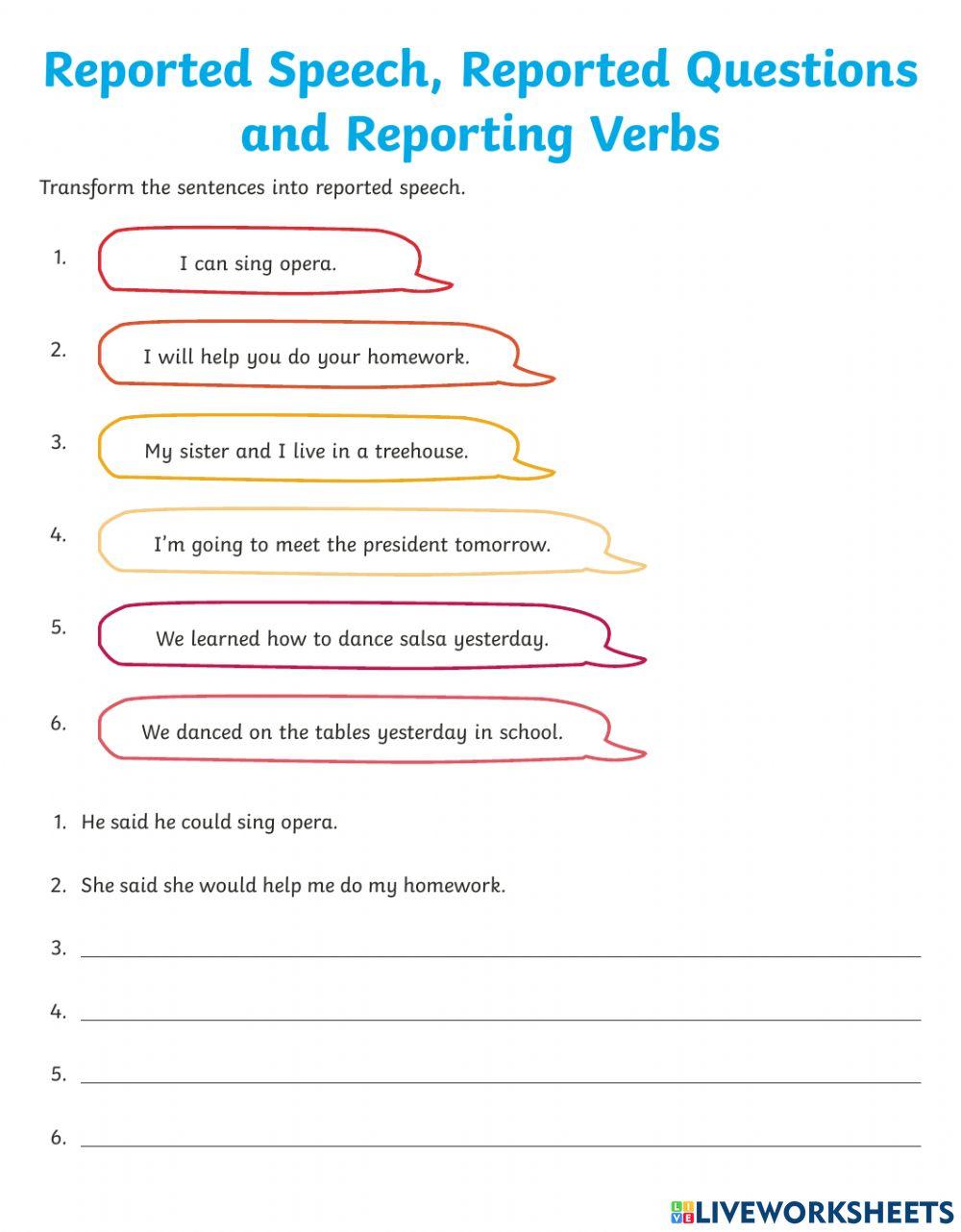
- Kindergarten
- Greater Than Less Than
- Measurement
- Multiplication
- Place Value
- Subtraction
- Punctuation
- 1st Grade Reading
- 2nd Grade Reading
- 3rd Grade Reading
- Cursive Writing
- Alphabet Coloring
- Animals Coloring
- Birthday Coloring
- Boys Coloring
- Buildings Coloring
- Cartoons Coloring
- Christmas Coloring
- Country Flag Coloring
- Country Map Coloring
- Disney Coloring
- Fantasy Coloring
- Food Coloring
- Girls Coloring
- Holidays Coloring
- Music Coloring
- Nature Coloring
- New Year Coloring
- People Coloring
- Religious Coloring
- Sports Coloring
- Toys Coloring
- Transportation Coloring
- US Sports Team Coloring
- Valentine Day Coloring
Direct Indirect Speech In Grade 6
Displaying top 8 worksheets found for - Direct Indirect Speech In Grade 6 .
Some of the worksheets for this concept are Direct and indirect speech, Direct and indirect speech work for grade 6 with answers, Direct indirect speech work grade 6, Direct to indirect speech, Direct and indirect speech, Direct speech, Direct and indirect speech, Direct and indirect speech work for grade 5 1.
Found worksheet you are looking for? To download/print, click on pop-out icon or print icon to worksheet to print or download. Worksheet will open in a new window. You can & download or print using the browser document reader options.
1. Direct and Indirect Speech
2. direct and indirect speech worksheets for grade 6 with answers, 3. direct indirect speech worksheet grade 6, 4. direct to indirect speech, 5. direct and indirect speech -, 6. direct speech, 7. direct and indirect speech -, 8. direct and indirect speech worksheets for grade 5-1.

Reported speech - 1
Reported speech - 2
Reported speech - 3
Worksheets - handouts
Reported speech
Worksheets - pdf exercises.
- Reported statements - worksheet
- Worksheet - reported questions
- Reported yes/no questions
- Worksheet - reported speech
- Reported speech - exercises pdf
- Indirect speech - exercises
- Reported speech - exercises
- Mixed reported speech 1
- Mixed reported speech 2
- Reported speech 1
- Reported speech 2
- Reported speech 3
- Reported speech 4
- Reported speech 5
- Reported wh- questions
- Reported speech - worksheet
- Reported commands
- Reported questions
- Reported speech 1
- Reported speech 2
- Reported requests and orders
- Reported speech exercise
- Reported questions - worksheet
- Indirect speech - worksheet
- Worksheets pdf - print
- Grammar worksheets - handouts
Grammar - lessons
- Reported speech - grammar notes
- How to use reported speech - lesson
- Tense changes - grammar

IMAGES
VIDEO
COMMENTS
Direct And Indirect Speech Worksheet for Class 6. Change the following sentences into indirect speech. 1. 'I have been to Spain,' said Ramesh. 2. 'I recognized him instantly,' she said to me. 3. 'I sent the money in the morning,' the clerk told the manager. 4.
Direct And Indirect Speech Practice Exercises for Class 6 CBSE. A. Complete the sentences into indirect speech. 1. Mohan (to Seema): I like your hairstyle. Mohan tells Seema : _____ 2. Parrot: I can speak English. The parrot says _____ 3. The fairy (to boy): I will grant you a wish if you won't tell a lie. The fairy tells the boy _____
Displaying top 8 worksheets found for - Direct And Indirect Speech Grade 6. Some of the worksheets for this concept are Indirect and direct quotations work, Direct and indirect speech work, Direct and indirect speech work, Direct and indirect speech, Name direct and indirect speech, Indirect and direct quotations work, Punctuating direct speech, Direct speech.
Answer Keys Here. Direct speech is basically a quote or the literal words that were spoken by a subject. When you use this in your writing it must be surrounded by quotation marks (" "). Using direct quotes helps your audience understand the frame of mind of the subject. Indirect speech is reporting what was said by a subject.
Direct Speech Indirect Speech now then today that day tonight that night last night the previous night, the night before yesterday the previous day, the day before tomorrow the next day, the day after next week the following week here there this/these that/those Change in verbs Direct Speech Indirect Speech will would can could
Miscellaneous Exercise on Direct & Indirect Speech for class 6. Convert the sentences from direct speech to indirect speech given below. The teacher said, "Nobody can answer the questions". The traffic police asked the man, "Do not park your vehicle here". The guide said, "You shall go to see the fort".
Our direct and reported speech worksheet pdfs are most recommended for children in 4th grade through 8th grade. Reported Speech with Time Expressions Kids in 5th grade, 6th grade and 7th grade convert sentences into indirect speech, paying attention to how expressions of time change here.
on June 15, 2023, 7:09 AM. Class 6 English Grammar Chapter 24 Direct and Indirect Speech. The word—speech—means whatever we speak or write. Speaking or writing the words of an another person can be done in two ways, 1. by repeating the words of the other person as they were, 2. by stating the meaning of the words of the other person in your ...
Direct Speech and Indirect Speech. Change the indirect speech into direct speech in this worksheet. 1. The movie was boring when changed becomes The speaker said that the movie was boring. Schools and students globally prefer Math and English worksheets from www.grade1to6.com, Subscribe today for a complete learning resource pack. Download Now.
In this Grade 6 English video lesson we will be teaching you about Direct and Indirect Speech.We've sourced highly-qualified and experienced South African te...
Grade 6 Direct Speech. Displaying top 8 worksheets found for - Grade 6 Direct Speech. Some of the worksheets for this concept are Direct and indirect speech, Direct speech, Direct and indirect speech, Grade 6 english, Punctuating direct speech, Direct and indirect speech, Direct and indirect speech, Direct speech work for grade 4.
Liveworksheets transforms your traditional printable worksheets into self-correcting interactive exercises that the students can do online and send to the teacher. ... Grade 6. Language: English (en) ID : 927533. 20/04/2021 ... simple present, simple past, direct speech, indirect speech Loading ad... Share / Print Worksheet. Google Classroom ...
Direct and Indirect Speech Exercises with Answers. When converting direct speech to indirect speech or vice-versa, you will have to take care to convert the verb, pronoun and the adverb appropriately. Go through the following exercises and try them out. Answers are given below each exercise; refer to them to see if your answers are right.
Direct Indirect Speech For Grade 6 - Displaying top 8 worksheets found for this concept.. Some of the worksheets for this concept are Direct indirect speech, Name direct and indirect speech, Direct and indirect speech exercise, Direct and indirect speech, Direct and indirect object work, Direct and indirect speech exercise, Reported statements mixed exercise, Reported speech work.
Liveworksheets transforms your traditional printable worksheets into self-correcting interactive exercises that the students can do online and send to the teacher. ... English language (1061957) Main content: Direct Indirect Speech (1940895) Identify Direct and Indirect Speech. Other contents: Identify Direct and Indirect Speech ...
Level: 6. Language: English (en) ID: 2129126. 30/08/2022. Country code: ZA. Country: South Africa. School subject: English language (1061957) Main content: Direct and indirect speech (2057325) language direct and indirect worksheet.
Displaying top 8 worksheets found for - Grade 6 Direct And Indirect Speech. Some of the worksheets for this concept are Indirect and direct quotations work, Direct and indirect speech work, Indirect and direct quotations work, Name direct and indirect speech, Direct and indirect speech, Direct and indirect speech work, Direct speech, Punctuating direct speech.
Grade 6 Indirect Speech - Displaying top 8 worksheets found for this concept.. Some of the worksheets for this concept are Direct and indirect speech work for grade 6 with answers, Direct and indirect speech, Direct and indirect speech, Direct and indirect speech work, Direct and indirect speech, Grammar and punctuation work, Indirect and direct quotations work, Parts of speech work.
Displaying all worksheets related to - Direct And Indirect Speech Grade 6. Worksheets are Indirect and direct quotations work, Direct and indirect speech work, Direct and indirect speech work, Direct and indirect speech, Name direct and indirect speech, Indirect and direct quotations work, Punctuating direct speech, Direct speech.
Liveworksheets transforms your traditional printable worksheets into self-correcting interactive exercises that the students can do online and send to the teacher. Grade 6 Direct and Indirect Speech Assignment online exercise for | Live Worksheets
Direct Indirect Speech In Grade 6. Displaying top 8 worksheets found for - Direct Indirect Speech In Grade 6. Some of the worksheets for this concept are Direct and indirect speech, Direct and indirect speech work for grade 6 with answers, Direct indirect speech work grade 6, Direct to indirect speech, Direct and indirect speech, Direct speech ...
Reported speech 2. Reported requests and orders. Reported speech exercise. Reported questions - worksheet. Indirect speech - worksheet. Worksheets pdf - print. Grammar worksheets - handouts. Grammar - lessons. Reported speech - grammar notes.